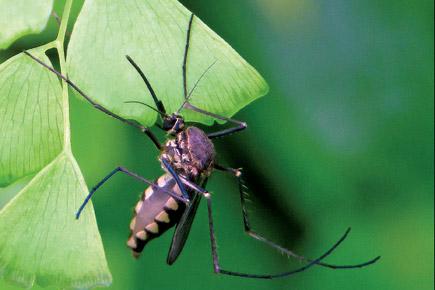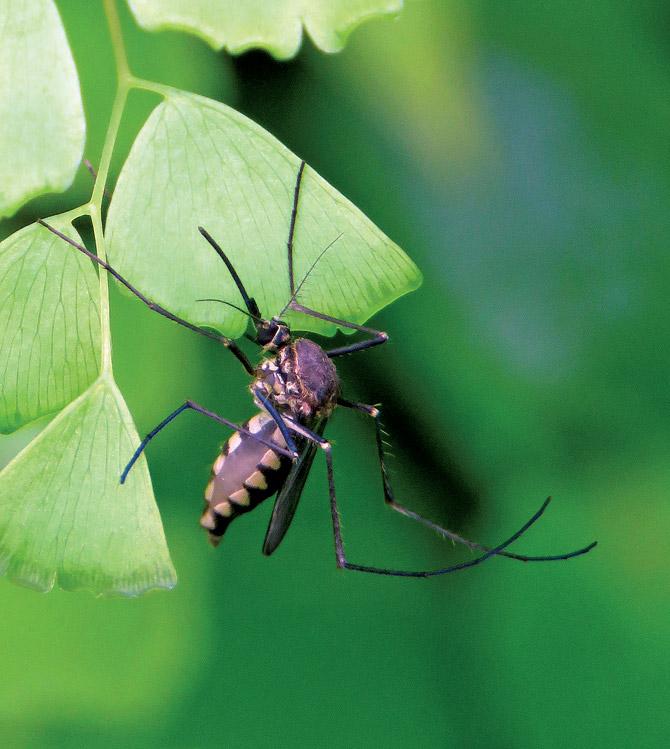Being an ardent trekker and nature enthusiast, wandering in the woods has been my calling for decades

Aides mosquito
 Being an ardent trekker and nature enthusiast, wandering in the woods has been my calling for decades. Funnily, a participant in one of my nature trails asked me, "How can you enjoy this Vanwaas (forest dwelling)?" For her, I was banishing myself to an arduous existence in the jungle. But, hardly did she know that listening to bird songs, the call of the cicadas, searching for camouflaged spiders, photographing multicoloured flowers and showering under the stars in perennial streams, is something stressed urbanites would pay a ransom for. Once in the wilderness, the only minor irritant that I have to concern myself with are the attention-seeking mosquitoes, buzzing around and taking jabs at me.
Being an ardent trekker and nature enthusiast, wandering in the woods has been my calling for decades. Funnily, a participant in one of my nature trails asked me, "How can you enjoy this Vanwaas (forest dwelling)?" For her, I was banishing myself to an arduous existence in the jungle. But, hardly did she know that listening to bird songs, the call of the cicadas, searching for camouflaged spiders, photographing multicoloured flowers and showering under the stars in perennial streams, is something stressed urbanites would pay a ransom for. Once in the wilderness, the only minor irritant that I have to concern myself with are the attention-seeking mosquitoes, buzzing around and taking jabs at me.

Aides mosquito
ADVERTISEMENT
These pesky mosquitoes, which mean 'little fly' in Spanish, make me wonder about their evolutionary journey, as they have survived many iceages and atmospheric variations. Found all over the world, except Antarctica and a few oceanic islands, they have historically used exhaled carbon dioxide, body odours, temperature and signs of movement to locate their host. There are thousands of species of blood sucking mosquitoes, all belonging to the Family Culicidae (meaning midge or gnat).
However, little do people know that both male and female mosquitoes feed on nectar and plant juices. Only the female mosquito uses its specialised mouth parts to supplement her diet with blood, a source of protein for egg development. The female's proboscis stabs two tubes into the skin — one to inject an enzyme that inhibits blood clotting and the other to suck blood. Although the blood loss is negligible, the irritation and inflammation caused by her saliva is a nuisance to many.
Millions of dollars are allocated the world over in research for the control and eradication of mosquitoes, as millions of people die annually due to their far more infamous role as a vector (carrier) of fatal diseases. Mosquitoes carry and transmit diseases such as malaria, yellow fever, chikungunya, west nile virus, dengue, filariasis, zika virus and other arboviruses (viruses transmitted through arthropods), which kill millions across the global annually.
This renders mosquitoes the deadliest animal family in the world. Besides humans, mosquitoes parasitise many invertebrates, mammals, birds, reptiles, amphibians and even some kinds of fish. Sadly, municipal corporations and health advisory bodies have historically relied more on bio-accumulating pesticides such as DDT, malathion and dieldrin among others, rather than biological controls. Thankfully, there are many natural predators such as frogs, insectivorous bats, dragonflies, damselflies and also birds such as fantail flycatchers.
The oldest mosquito was found in a 79-million-year-old Canadian amber from the Cretaceous Era. Even today, they employ the same feeding, hunting and breeding techniques. Male mosquitoes congregate in enormous swarms during the crepuscular hours, humming and whistling to attract females. The choir arouses sufficient interest and the females lay clumps of eggs in water bodies following copulation. The most effective way to control mosquito outbreaks is by understanding their breeding cycles.
Different mosquito species lay their eggs in fresh, stagnant or flowing waters, in forest or urban locations. Their larvae and pupae are floating and can easily be killed by spraying oil or simply draining or covering water sources, such as discarded tyres, cans, bottles, aquaria, overhead water tanks and swimming pools. Adding predators such as guppies or Gambusia fish have also proven most effective.
Currently, we run at the sight of these buzzing pests. But, if the cure for HIV lies in the saliva of the blood-thirsty mosquito, soon we may find molecular biologists running after these multi-millennial creatures.
Write in to Anand at sproutsenvttrust@gmail.com
 Subscribe today by clicking the link and stay updated with the latest news!" Click here!
Subscribe today by clicking the link and stay updated with the latest news!" Click here!







